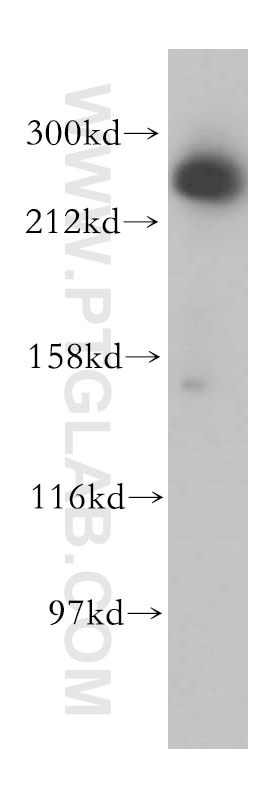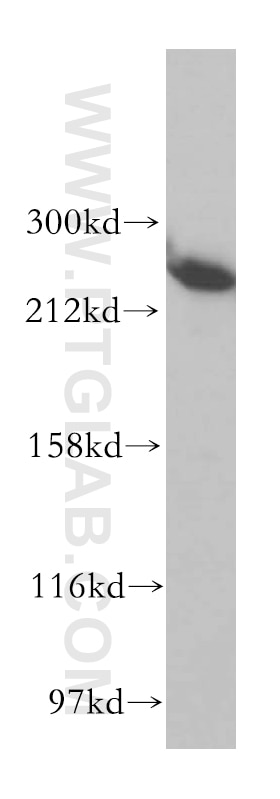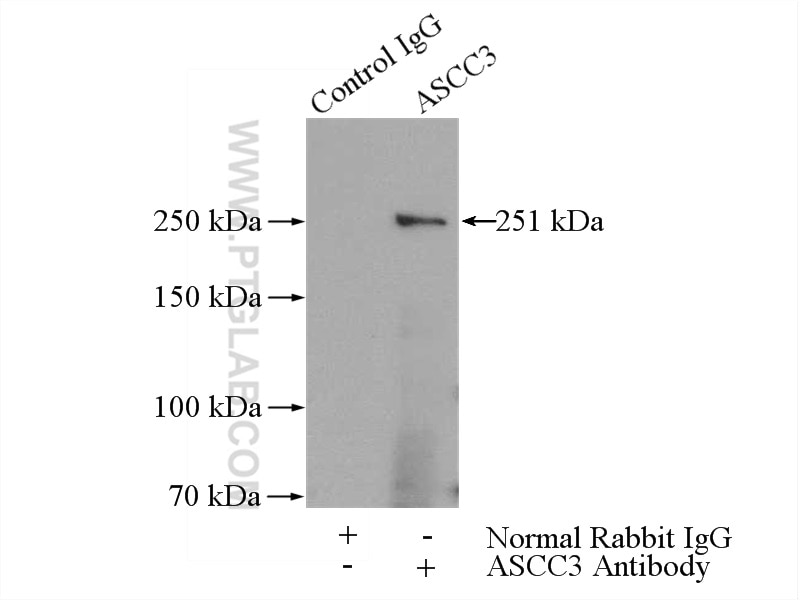ASCC3 Polyklonaler Antikörper
ASCC3 Polyklonal Antikörper für WB, IP, ELISA
Wirt / Isotyp
Kaninchen / IgG
Getestete Reaktivität
human und mehr (1)
Anwendung
WB, IP, ELISA
Konjugation
Unkonjugiert
Kat-Nr. : 17627-1-AP
Synonyme
Geprüfte Anwendungen
| Erfolgreiche Detektion in WB | HeLa-Zellen, HepG2-Zellen |
| Erfolgreiche IP | HeLa-Zellen |
Empfohlene Verdünnung
| Anwendung | Verdünnung |
|---|---|
| Western Blot (WB) | WB : 1:500-1:2400 |
| Immunpräzipitation (IP) | IP : 0.5-4.0 ug for 1.0-3.0 mg of total protein lysate |
| It is recommended that this reagent should be titrated in each testing system to obtain optimal results. | |
| Sample-dependent, check data in validation data gallery | |
Veröffentlichte Anwendungen
| WB | See 7 publications below |
| IP | See 2 publications below |
Produktinformation
17627-1-AP bindet in WB, IP, ELISA ASCC3 und zeigt Reaktivität mit human
| Getestete Reaktivität | human |
| In Publikationen genannte Reaktivität | human, Maus |
| Wirt / Isotyp | Kaninchen / IgG |
| Klonalität | Polyklonal |
| Typ | Antikörper |
| Immunogen | ASCC3 fusion protein Ag11848 |
| Vollständiger Name | activating signal cointegrator 1 complex subunit 3 |
| Berechnetes Molekulargewicht | 111 aa, 13 kDa, 251 kDa |
| Beobachtetes Molekulargewicht | 251 kDa |
| GenBank-Zugangsnummer | BC050681 |
| Gene symbol | ASCC3 |
| Gene ID (NCBI) | 10973 |
| Konjugation | Unkonjugiert |
| Form | Liquid |
| Reinigungsmethode | Antigen-Affinitätsreinigung |
| Lagerungspuffer | PBS with 0.02% sodium azide and 50% glycerol |
| Lagerungsbedingungen | Bei -20°C lagern. Nach dem Versand ein Jahr lang stabil Aliquotieren ist bei -20oC Lagerung nicht notwendig. 20ul Größen enthalten 0,1% BSA. |
Hintergrundinformationen
ASCC3 (Activating Signal Cointegrator 1 Complex Subunit 3) is a multifunctional protein involved in various cellular processes, including transcriptional regulation, DNA repair, and ribosome quality control. It is a member of the ASCC (Activating Signal Cointegrator 1 Complex) family, which functions as a bridge between co-repressors and co-activators in transcriptional regulation.
Protokolle
| PRODUKTSPEZIFISCHE PROTOKOLLE | |
|---|---|
| WB protocol for ASCC3 antibody 17627-1-AP | Protokoll herunterladen |
| IP protocol for ASCC3 antibody 17627-1-AP | Protokoll herunterladen |
| STANDARD-PROTOKOLLE | |
|---|---|
| Klicken Sie hier, um unsere Standardprotokolle anzuzeigen |
Publikationen
| Species | Application | Title |
|---|---|---|
Nat Commun Extended DNA threading through a dual-engine motor module of the activating signal co-integrator 1 complex | ||
Nat Commun Stalled translation by mitochondrial stress upregulates a CNOT4-ZNF598 ribosomal quality control pathway important for tissue homeostasis | ||
Mol Cell Unresolved stalled ribosome complexes restrict cell-cycle progression after genotoxic stress. | ||
Sci Rep Identification of a novel trigger complex that facilitates ribosome-associated quality control in mammalian cells. | ||
Cell Metab Ribosome stalling is a signal for metabolic regulation by the ribotoxic stress response | ||
Rezensionen
The reviews below have been submitted by verified Proteintech customers who received an incentive for providing their feedback.
FH Tom (Verified Customer) (10-24-2023) | (Already in contact with technical support, but was asked to submit a review here as well.) Immunoblotting for ASCC3 from fresh cell extracts did not work. Included samples of ASCC3-KD (siRNA) experiment, but only unspecific bands. Tested 1:1000 and 1:500 dilution. Tested different protein extraction buffers and conditions, used fresh cells each time. Transfer of large proteins was confirmed. Sadly, for us this antibody did not work.
|




